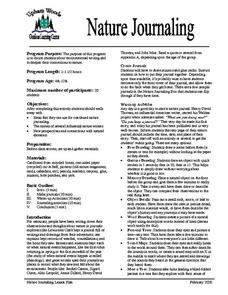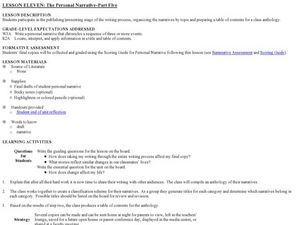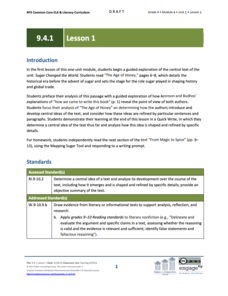Education World
Black History Month Rap
Young scholars write a rap or hip-hop lyric about the life of a famous Black American. They explore famous Black Americans in history and explore how the rap form compares to other forms of poetic expression.
Curated OER
My Alphabetical Autobiography
Design a pictorial autobiography using the letters of the alphabet. For each letter, writers select visual images that represent life events and interests. Younger writers add words or sentences of explanation while older writers narrate...
Curated OER
Active and Passive Voice Worksheet 2
How are active and passive sentences constructed? After introducing your intermediate writers to each and providing examples, complete this two-page worksheet. Your writers take the sentences written and transform them from active to...
Curated OER
Blogging
A fun, modern twist on journaling! Instead of responding to prompts in their composition notebook, writers use the Internet to complete blog entries. A sample blog (with prompts) is shown here, and writers are assessed on conventions and...
Curated OER
Nature Journaling
Writers participate in a unique form of environmental writing and deepen their connections to nature through journaling. They generate new ideas and thoughts that they can use for continued nature journaling and explore a variety of...
Curated OER
Writing Bug: Creative Writing
Do your writers have the writing bug? Give them this short prompt as today's writing activity. They have to decide how they'd spend $100,000, but they can't spend it on themselves! There's also a rectangular box at the bottom of the...
Curated OER
Intermediate Making a Formal Argument: Giving and Receiving
Give your middle school writers the opportunity to form an opinion and provide strong supporting details. Writers will respond to the statement "It is better to give than to receive." This is a particularly good assignment to use if your...
Curated OER
Fractured Fairy Tales
Through reading and writing, learners explore common elements found in fairy tales. After discussing traditional fairy tales, class members listen to The True Story of the 3 Little Pigs by John Scieszka, a hilarious retelling of the...
Curated OER
Allusion in Poetry
Emerging writers identify allusion in poetry by listening to recorded poems, like Anyone Lived in a Pretty How Town. They also discuss what makes writing satirical and how writers use allusions to make satirical points.
Curated OER
The Personal Narrative - Part Five
Create a class anthology with your young writers. In this personal narrative instructional activity, each writer reflects on actions and events from their own lives and chronicles them in a three-part written sequence. They create a...
Curated OER
Personification
Young writers discover that personification is when a writer gives an object the qualities of a person. After practicing identifying personification in many of the slides, individuals compose their own poem that uses this technique. They...
Curated OER
Basic Five Paragraph Essay
Introduce your young writers to the basic five-paragraph essay. The fun part of this presentation is the stance of the essay used to illustrate the format. The writer of the model essay contends that the Twilight series is a terrible...
Curated OER
Lesson Plan 13: Going Deeper Mini-Lesson
November is NaNoWriMo, or National Novel Writing Month! If your class is participating (or simply doing a narrative writing unit), this peer review lesson is part of a larger unit which can be easily found online. Once your writers have...
Curated OER
Thesis statements: The Six Basic Claim Types
Evaluative or Analogical? The wolf in the story of "The Three Little Pigs" and the wolf in "Red Riding Hood" represent what can happen to the unprepared. Despite his defeat in the end, the Big Bad Wolf is a good example for kids because...
Virginia Department of Education
Developing an Essay: Word Choice
Grading essays after reading a novel written by a lyrical master (think Nabokov, Morrison, Chabon) is a deflating experience. Why can’t your student’s display the same skill in diction as your favorite writers? Because you did not use...
EngageNY
Revising: Strong Conclusions for My Accessing Books Around the World Informative Paragraph
It's important that writers leave their readers with a strong and satisfying conclusion. Help your young writers develop the skills to compose a concluding sentence with the steps outlined here. After class members have had a chance to...
Curated OER
Prewriting Web
To accomplish great things, and to produce great essays, writers plan. Introduce your young writers to the prewriting stage of the writing process with a template that asks them to brainstorm and list as many ideas as possible....
EngageNY
Revising for Organization and Style: Bold Beginnings
Get young writers thinking about how to write a great beginning for their narratives. After examining examples of solid beginnings in literary text, young writers discuss the criteria for a compelling introduction. Then, independently,...
Scholastic
Persausive Writing
A unit on persuasive writing guides elementary learners through the writing process. The first part examines the elements of persuasive writing, including expressing an opinion, connecting ideas, using supporting facts, and writing...
Curriculum Corner
"Would You Rather?" Writing Prompts
Would you rather eat a cricket or a worm? Have your young writers decide and write about why. Choose from 35 different writing prompts to spark interest and creativity. Even your most reluctant writers are sure to enjoy. Each prompt also...
EngageNY
Grade 9 ELA Module 4, Unit 1, Lesson 1
How do writers introduce and develop the central ideas in a text? To answer this question, ninth graders closely examine "The Age of Honey," the opening chapter in Marc Aronson and Marina Budhos' Sugar Changed the World: A Story of...
EngageNY
Grade 9 ELA Module 4, Unit 1, Lesson 28
As writers continue to revise their argument essays, the focus shifts to editing grammatical conventions, parallel structure, and varying syntax to add interest. After examining model sentences that demonstrate sentence variety, writers...
EngageNY
Grade 9 ELA Module 4, Unit 1, Lesson 2
The second instructional activity in a unit about how writers develop their central ideas and use evidence to support their arguments focuses on the role that scholars at Jundi Shapur, "The World's First True University," played in the...
University of North Carolina
Gender-Inclusive Language
In the past, if writers weren't sure of a person's gender, they simply used masculine pronouns. Today, however, as a handout on gender-inclusive language explains, writers must choose pronouns carefully. To promote the use of gender...
Other popular searches
- Freedom Writers
- Writers Workshop
- Writers Notebook
- Writers Craft
- Freedom Writers Movie
- Writers Craft Story Starters
- Natural History Writers
- Writer's Workshop
- Writers Block
- Freedom Writers Diary
- Women Writers
- Beat Writers

























